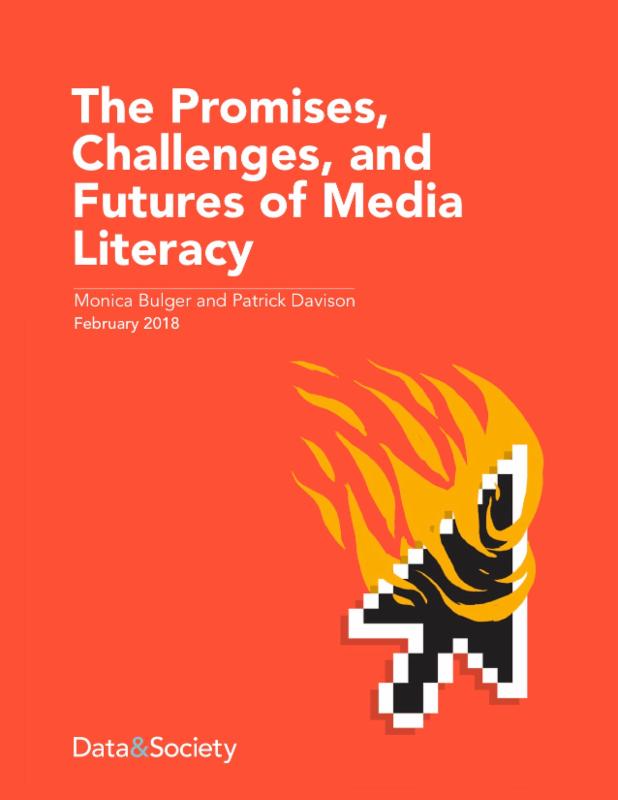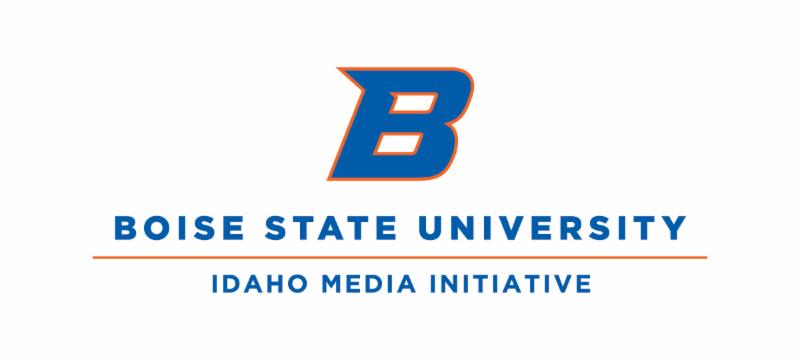"There remains a belief that good information is out there, that with the right set of skills, individuals can sort through and find something useful. If bad actors intentionally dump disinformation online with an aim to distract and overwhelm, is it possible to safeguard against media manipulation? These questions and their high-stakes answers have focused renewed attention on the field of media literacy."
- Monica Bulger and Patrick Davison

Last week,
Data and Society's Media Manipulation Initiative published a report entitled
The Promises, Challenges, and Future of Media Literacy. The report, written by
Monica Bulger and
Patrick Davison
examines the research base for media literacy across four themes: what is media literacy, how can media literacy help, how can media literacy fail, and the future of media literacy. If you have not read the report yet, you should. It is so relevant to our community that we are setting up a webinar for NAMLE members on Wednesday, March 13 at 7pm to discuss the report with one of the authors, Monica Bulger. If you are interested in participating, please email us at [email protected].
The report makes the five following recommendations for the future of media literacy work:
-
Develop a coherent understanding of the media environment.
-
Improve cross-disciplinary collaboration.
-
Leverage the current media crisis to consolidate stakeholders.
-
Prioritize the creation of a national media literacy evidence base.
-
Develop curricula for addressing action in addition to interpretation.
There is a lot to unpack in the report, and I would love to hear from you about your reaction and thoughts. I am especially interested in the NAMLE community developing some answers to the open questions the report proposes. Please email me at
[email protected] if you are interested in sharing your ideas. I hope you will join me in my conversation with Monica on March 13. Feel free to send questions beforehand.
NAMLE NEWS

To build off the successful Media Literacy Week 2017 kick off event we had at Reuters, we are developing a series of public discussions between students, educators, and journalists to launch honest, constructive discussions exploring the intersections between journalism, media literacy and student voice. Our first event is being organized with Boise State University in Boise, Idaho on Wednesday, April 11.
I am super excited about the event. We are working with our partners at Reuters to bring journalists to the event. Journalism Education Association is helping us recruit teachers and students. NAMLE Organizational Partners the Newseum and Pen America will be joining us to share their work. We are solidifying our speaker list, attendee outreach plan, and schedule. If you are interested in learning more or even joining us, let us know by emailing us at [email protected].
Sincerest thanks to our sponsor,
Trend Micro, for their generious support of this event.
We have a new JMLE author profile piece up on the NAMLE website. This month we interviewed
Dr. Elia Powers and
Dr. Beth Haller of Towson University, whose paper on disability representation in higher education textbooks was recently published in
JMLE 9.2, a special issue on media literacy and disabilities. Read the profile
here. Read their paper
here.
I'm working closely with our conference team, led by NAMLE Leadership Council Members
Belinha De Abreu and
Yonty Friesem, to solidify dates, location and theme for our summer conference in 2019 in Washington D.C. I've heard from some of you about volunteering to help with conference planning. Thank you! If you have not been in touch and are interesting in being on the conference committee, please email [email protected].
FINAL THOUGHTS #studentvoice
"I'm like a parent that is just beaming with pride in terms of how they have been able to express themselves."
- Broward Schools Superintendent Robert Runcie
Read more here: http://www.miamiherald.com/news/local/education/article201678544.html#storylink=cpy
I would be remiss if I didn't mention what is on all of our minds these past couple of weeks: the mass shooting at
Marjory Stoneman Douglas High School in Parkland, Florida. As a parent of a 13 and 15 year old, I spend my days surrounded by teenagers. The idea that one of them or their friends and classmates could be the victim of such a violent act is too much to bare. When I see the faces of those that lost their lives and I hear the voices of their parents, I am overwhelmed. Then I look at my Twitter feed or listen to a podcast or turn on the TV and what I see and hear are the brave, strong, and powerful voices of the students from Parkland. I am overwhelmed again. But not by sadness. By hope. By the power of student voice. By the bright light that is the future generation.
Whether you agree or disagree with their efforts, there is something incredibly inspiring about students standing up for what they believe in and finding their voice. Their courage deserves our respect.
I imagine if you are working in a school that there have been discussions about this tragedy. Have you found any resources that have helped you in your conversations? I was intrigued by Facing History and Ourselves framing of the issue for the classroom. I also thought News Literacy Project did a thorough job exploring conspiracy theories and fake stories in their newsletter The Sift. I also believe this NPR interview with student journalists from Marjory Stoneman Douglas High School shared a really interesting perspective. Please share any materials you found useful. I'd like to share them with our community.
As always, please know I am here if you have any questions or want to share any thoughts about NAMLE or media literacy education in general.
Be well,
 |
Michelle Ciulla Lipkin
Executive Director [email protected] @ciullalipkin @medialiteracyed |
|
|
|
|
|